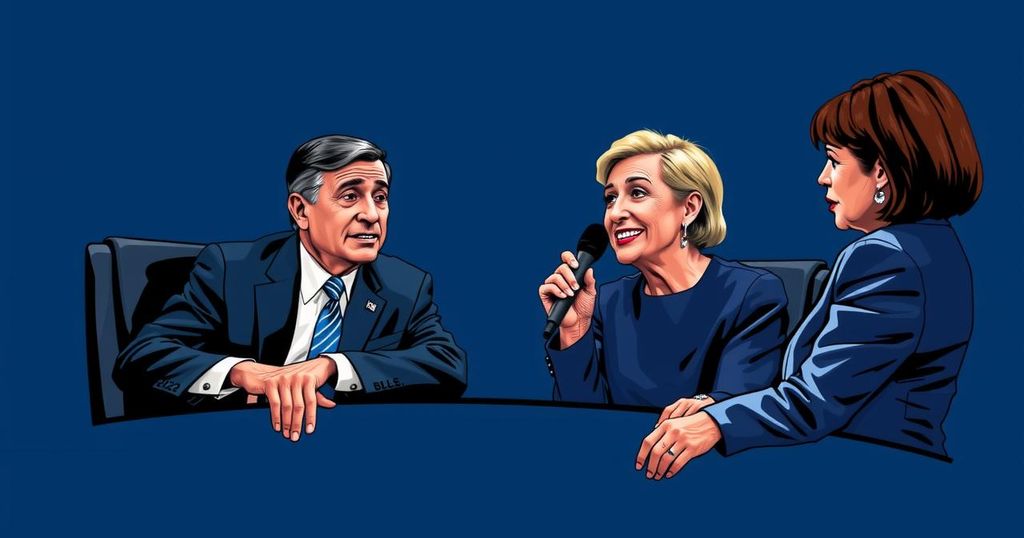Democrats are divided over the implications of their recent electoral defeat, with some leaders advocating for optimism while others call for significant changes to better connect with voters. As Trump prepares to take office, the party faces internal discord regarding its future direction, struggling to unify its message and engage disenfranchised constituencies. The upcoming Democratic National Committee chair election will be crucial in shaping the party’s strategy going forward.
In the wake of a significant electoral defeat, Democrats are grappling with contrasting assessments of their political landscape. Despite losing critical contests, particularly to Donald Trump, some party leaders minimize the implications by attributing losses to external factors like inflation. Conversely, others perceive a dire need for a comprehensive reevaluation of the Democratic brand and policies to re-engage disillusioned voters, particularly among working-class populations. The party lacks consensus on a definitive strategy, causing internal discord regarding its future direction.
One prominent Democratic official, Colorado Governor Jared Polis, asserts that the election outcome provides a foundation for optimism, suggesting that minor shifts in voter support could yield major victories. Yet, Ken Martin, chair of the Minnesota Democratic-Labor-Farmer Party, characterizes the election results as “a damning indictment” of the party’s disconnect with many constituents. This divergence in perspectives highlights the urgency of addressing the party’s messaging and identity as it faces a potentially revitalized Trump administration taking office soon.
As discussions unfold, groups such as Priorities USA are preparing insights intended to enhance voter engagement and propose a more appealing alternative to Trump’s agenda. Reports indicate a potential risk of alienating key demographic groups, particularly among young and diverse voters, if the party does not recalibrate its approach. Figures like Senator Bernie Sanders emphasize the necessity for fundamental change, critiquing the Democratic Party for its failure to adequately represent the working class.
Sustaining this critical dialogue, California Representative Ro Khanna advocates for a new economic framework aimed at revitalizing the middle class. He stresses the importance of adapting to contemporary voter needs and broadening outreach efforts, including engagement on diverse media platforms. As the Democratic National Committee prepares for a leadership selection, it faces the challenge of unifying various factions and developing a coherent agenda that resonates across the electorate.
Amidst varied opinions, party figures such as Wisconsin Democratic Party Chair Ben Wikler entreat the necessity for improved communication strategies to regain lost ground. While some contend that recent electoral shifts may not signify an enduring trend, the overarching sentiment underscores the importance of strategic alignment moving forward. The forthcoming DNC chair election serves as a pivotal moment for the party’s future trajectory, potentially determining whether it can effectively recalibrate in response to recent setbacks.
The Democratic Party has been undergoing scrutiny following a considerable electoral loss that highlighted fissures within its base. The election results raised concerns about the party’s engagement with various demographic groups, particularly working-class voters, and its overall brand identity. As Donald Trump ascends to power, Democrats are at a crossroads, grappling with internal divisions while considering how to reposition themselves to appeal to an electorate that has shown signs of discontent. The party’s leadership faces a dual challenge: to analyze electoral feedback comprehensively while fostering unity among differing ideological factions. This critical reflection occurs in a landscape where public sentiment towards economic and social policies is rapidly evolving, necessitating an adaptive strategy moving forward. The internal party discourse centers on understanding the implications of a transitory shift among voters and evaluating whether the party’s core messaging aligns with contemporary societal values. The implications of these discussions are vital as they will influence the Democratic Party’s capacity to mount effective resistance to the Republican agenda under Trump’s renewed presidency.
In conclusion, the Democratic Party finds itself at a pivotal juncture following recent electoral losses. The lack of a unified perspective on their challenges complicates efforts to adapt and respond effectively. Some party leaders remain optimistic about regaining ground, while others call for a critical reassessment of policies and communication strategies to better resonate with disenchanted voters. The upcoming DNC chair election will be crucial, as it may determine the party’s approach moving forward in an increasingly polarized political environment.
Original Source: abcnews.go.com






